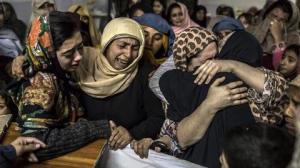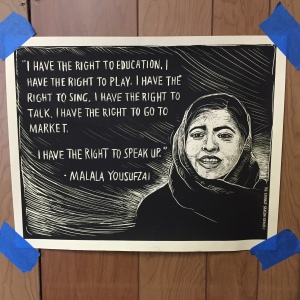Texts: 2 Samuel 7:1-11,16 + Luke 1:46b-55 + Romans 16:25-27 + Luke 1:26-38

A young adult friend of mine told me that she’s spending the month of January in Sydney, Australia with classmates from her college. Normally this would have been unequivocally exciting news for both of us, but I noticed that my first response wasn’t joy. It was anxiety. In the week since we last gathered here for worship we have seen the faces of everyday people pressed up against the glass of a downtown cafe where they were held hostage by a lone gunman with a long history of violence against both intimate partners and strangers.

No sooner had that crisis come to a brutal ending, than we learned of an attack on a school full of Pakistani children that left 145 people dead. I remember listening to the news coverage of this event while driving home from work in my car, wondering why anyone would target innocent school children. What political motivation could there possibly be for the wholesale slaughter of unarmed civilians? Then I heard the Taliban’s spokesperson say, “we targeted the school because the Army targets our families. We want them to feel our pain.”
That immediately took me back to the terrorist strikes against the United States on September 11, 2001. Our shock at watching the Twin Towers fall, and with them any sense that we are removed from the politics of our nation. We live in a time when terror rains down from the sky and violence is the preferred solution to conflict. No side can claim the moral high ground when it comes to the taking of innocent lives, whatever those are. The line between innocent and implicated has been blurred past the point of recognition. If the message of those we call terrorists says anything, it seems to say that those who benefit from the arrangement of power and wealth enforced by state-sanctioned violence will not be protected from the wrath of those who are trying to rearrange the balance of power by any means necessary.
It is no easy thing to make sense of Mary’s song in times like these. “[The Mighty One] has brought down the powerful from their thrones, and lifted up the lowly.” Who is she talking about? Who are the powerful? Where are their thrones?
More importantly, where did Mary find the courage to sing her song? What ever would have led a pregnant, unwed young woman to believe that the life being born in her, a life that would be born into oppression and occupation, could change the balance of power in the world?
 Do you know who Mary reminds me of? Can you think of a more inspiring young woman than Malala Yousafzai? She wasn’t even a teenager when she began blogging for the BBC on the plight of girls seeking an education in Pakistan. She was only 15 when she was shot three times, once in the head, for her activism. Yet she remained unbroken. She said, “I don’t want to be remembered as the girl who was shot. I want to be remembered as the girl who stood up” and “the terrorists thought they would change my aims and stop my ambitions, but nothing changed in my life except this: weakness, fear and hopelessness died. Strength, power and courage were born.”
Do you know who Mary reminds me of? Can you think of a more inspiring young woman than Malala Yousafzai? She wasn’t even a teenager when she began blogging for the BBC on the plight of girls seeking an education in Pakistan. She was only 15 when she was shot three times, once in the head, for her activism. Yet she remained unbroken. She said, “I don’t want to be remembered as the girl who was shot. I want to be remembered as the girl who stood up” and “the terrorists thought they would change my aims and stop my ambitions, but nothing changed in my life except this: weakness, fear and hopelessness died. Strength, power and courage were born.”
Malala didn’t come into the world an activist. She was raised and nurtured in a family of politically engaged people. Her family owns a number of schools and her father has been an educational activist. He remembers that from an early age, Malala stayed up late into the night listening to him talk politics and joining in.
Likewise, Mary draws on centuries of Hebrew prophetic rhetoric. Her song, the Magnificat, which we sing this time of year with great relish is a magnification of the song of Hannah, who dedicated her child Samuel to the Lord with these words,
My heart exults in the Lord; my strength is exalted in my God. Those who were full have hired themselves out for bread, but those who were hungry are fat with spoil. The Lord makes poor and makes rich; [God] raises up the poor from the dust; [God] lifts the needy from the ash heap, to make them sit with princes in seats of honor. (1 Sam. 2:1,5,7,8)
These young women are exceptional, but they aren’t unique. They are extraordinary, but they are not inaccessible. They are signs of what happens when we allow the spirit of God to be born in us, when we say “Here am I, the servant of the Lord. Let it be with me according to your word.” (Luke 1:38) Or, in Malala’s words, “Some people only ask others to do something. I believe that, why should I wait for someone else? Why don’t I take a step and move forward?”
One more Malala quote before I lose my voice or get lost in a fit of coughing. She has said, “If you hit a Talib with your shoe, then there would be no difference between you and the Talib. You must not treat others with cruelty and that much harshly, you must fight others but through peace and through dialogue and through education.”
This is the true reversal, the real upheaval. If we allow ourselves to get lost in the question of who is the mighty on their throne, we will stay trapped in justifications for violence. Nations will legitimate their use of drones and terrorists their use of suicide bombers. But, if we focus on unseating violence itself then we are truly getting to the heart of the matter. We stop playing musical chairs, replacing one violent power with another, and we begin building the world from the bottom up, from the vantage point of the lowly, through the eyes of the unarmed Black teenager, the Pakistani school girl, the hungry day laborer. We begin building a world where the good things of God — food, shelter, family, love, education, community, justice and peace — are shared among us all.
Mary and Malala, extraordinary prophets of hope flinging their fragile bodies forward into a world weary of war. Surely they are not alone. Surely God is being born in us as well.
Amen.